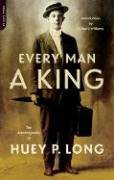
BUY IT AT AMAZON: CLICK HERE!
PUBLISHER: Da Capo Press
MSRP: $15.95
PAGES: 412
This
reprinting of Huey P. Long’s 1933 autobiography comes well-timed into the
modern political forum. Long was a political of unusual celebrity for his time,
and his understanding of democracy as a theory was tentative at best, downright
naïve at worst. His tendency to act without regard to intelligence from his
advisors, and his eventual power-grabbing by outwardly genteel means, ought to
remind any reader of recent events in American politics.
There’s
an odd democracy to celebrity, even if politics are set aside. It’s the mandate
of the people which, at some percentage, decides who gets to hog to spotlight
on a given week. Whoever grabs our interest, or whoever flashes their cooter,
gets our attention. It’s an excellent example of why a strict democracy
couldn’t function on a nation-wide scale. It also illuminates how similarly we
treat political figures and movie stars.
From such
attention, the savvy statesman can derive a so-called mandate of the masses.
Certain presidents have figured this out, as have elected officials all the way
down the fall of power. None seem to have done so with such blatant
self-congratulation, though, as Huey P. Long, the self-named
"Kingfisher," and career politician from
gutters, selling potatoes to get himself through law school; from there he
worked his way all the way up to the governorship.
His
political record was not so squeaky-clean as his feel-good origins implies,
however. What interests most about his character is that he creates a low-level
cult of personality around himself, casting his actions as those of a
"good old boy" from the same streets as his constituency. Not only
that, but he framed his most ostentatious maneuvers as "the best" for
the people, stepping into a father-figure role that crops up more frequently in
authoritarianism than in democracy. Where in later decades the American dreamed
would be phrased as a car in every garage, a chicken in every pot, Long
declared that he would make "every man a king," going so far as adopt
the phrase for his autobiography. The only thing he asked in return was
something approaching absolute power.
If that’s
what’s fascinating about the man, then what really sells the book as an
interesting read is the fact that it’s the very same condemnations, but in
Long’s own words. It’s a wonderful exercise in reading between the lines, as
Long’s crisp and elevated diction meets down-home phraseology in a textbook
case of obfuscation. As a puff piece, it’s extraordinarily successful; as an historical
record, it’s alarmingly picky about the truth. There’s a sense of charm
imparted on the text thanks to retrospect. Here we have the attempt of a
meat-and-potatoes politician to assert his own importance viewed through the
context of history having already remembered him as it chose.
It is mildly frightening — and might even qualify as schadenfreude if the
situations weren’t set in
much power while he was in office. Consider his posturing toward improving the
quality of life for his fellow Americans; his "every man a king"
claim is as vague and functionally directionless as our sitting president’s fallback
line of protecting us from the terrorists. Both are touchstones without the
empirical reasoning to back them up, and both have won the loyalty of many
individuals who are apparently glad to trade base freedoms for intangible
ideals.
However,
Long’s life is not at all allegorical to the situations of modern politics. Every
Man a King is a worthy read even today not because it comments on our
time but because it illuminates disparities — real and imagined — between the
early twentieth century and our fledgling twenty-first. Are we more cynical of
our leaders now? What degree of intentional celebrity do we tolerate from our
officials? The consideration of these questions on the framework of the Bill of
Rights makes for an engrossing and relevant read. For the careful reader, the
book imparts a humorous moral amid its creepy confluence of celebrity and mild
dictatorship: Save us from those who think they know what’s best for us.
Judging the Book by its Cover: There’s nothing particularly
impressive about this cover art. It sparks a little interest with the inherent
irony between the title and the selected picture. Mostly what you get is an
incongruous introduction to the book’s subject, as Long rose above such ragtag
origins too quickly for your sympathy to catch hold of.